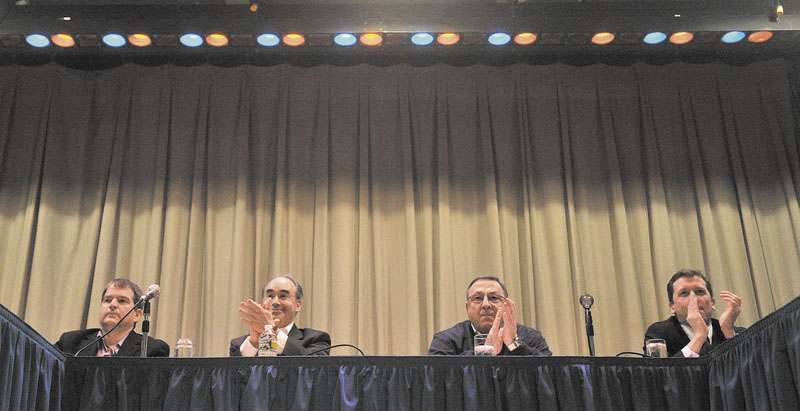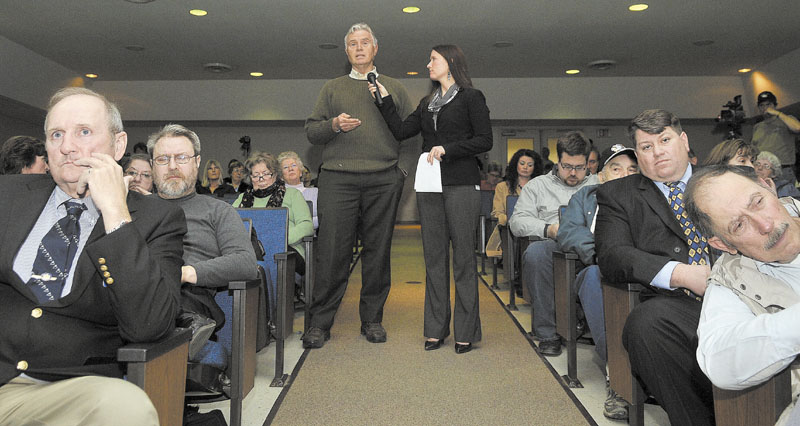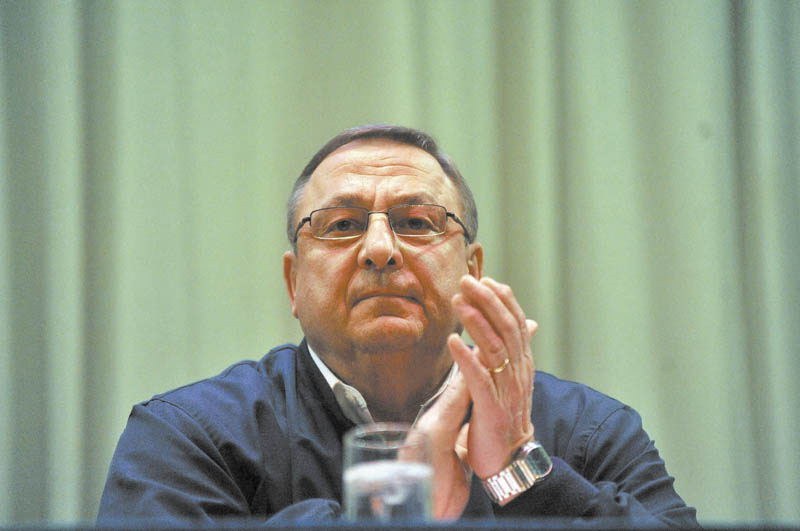MADISON — Somerset County residents attending a town-hall style meeting with Gov. Paul LePage Thursday night were among the first to learn that he signed the Department of Health and Human Services budget, which the Senate passed earlier in the day.
LePage also put in a pitch for a proposal by a private company to build a natural gas line through central Maine, instead of Madison residents borrowing money to build it themselves.
Residents are considering whether the town should borrow $72 million to build the pipeline, while Kennebec Valley Gas Co., a Portland company, is vying to be the one to construct it.
About 100 people attended the governor’s Capitol for a Day event at Madison Area Junior High School. They asked LePage questions about proposed public funding of religious schools, a possible east-west highway across the state and ways to reduce energy costs.
At the beginning of the meeting, Press Secretary Adrienne Bennett said that the governor had signed the emergency DHHS budget, which closes a $121 million immediate gap at the department. He had 10 days to decide whether to sign, veto or let the bill become law without his signature.
LePage spent much time discussing energy options after Cory King, executive director of the Skowhegan Area Chamber of Commerce, described the issue as crucial to the region and state.
LePage and State Treasurer Bruce Poliquin both said they hoped natural gas would expand into the area soon.
LePage added that he thought it would be best for a private company to build a natural gas pipeline.
“If I were the people in this community, I would think you want to protect your tax base. You want to make sure that you get the most for your money and the most for your money to me would be having the private investor put the pipe in,” he said.
After Madison residents turned down a proposal in November to borrow $72 million for the town’s project, residents collected signatures to bring the issue to a second vote. There will be a public hearing on the proposal Wednesday, and the town will vote again whether to borrow $72 million for the Madison project on Tuesday, March 13.
The town has said it won’t agree to a tax break that Kennebec Valley Gas is asking for from the 12 communities the gas line would go through, but the company pushed actively against the town’s planned gas line before the November vote.
Madison Town Manager Dana Berry declined to offer a reaction after Thursday’s event, saying only, “I think the governor’s comments need further explanation.”
LePage visited a number of Somerset County businesses Thursday, including Madison Paper Industries, which he said could drastically reduce its energy costs with natural gas. The mill was sold in August to Finnish giant UPM-Kymmene Corp.
“As a governor, do I want them here? You bet. Am I going to do everything I can to get natural gas to them? You bet,” he said.
Bob Hagopian, chairman of Madison selectmen, told LePage it is extremely difficult for people in the area to pay taxes, heating oil costs and other bills, calling it a crisis.
“Amen. I’m with you 100 percent,” LePage said. The difficulty, he said, is that there are two competing philosophies in Maine, one that supports a highly involved government, or “welfare state,” and another “that says we should try to revive the American dream.”
He added, “I’m on that side.”
Bob Farley, of Norridgewock, said he questioned the wisdom of a recent proposal to provide public funding to religious schools.
On Feb. 8, LePage and the education commissioner announced legislation that would allow public funding of religious schools, change how teachers are evaluated, provide students with more school choice and expand technical education.
“The public should not, in my opinion, be forced to fund religious education,” Farley said.
LePage replied that the issue is not about religion, but about letting students and parents choose the school that is best for them, whether it is religious, private or public.
“My philosophy is very simply this: It’s all about the student and … the best place for that student to get an education is where that student should go, and that choice should be left up to the parents,” he said.
Hallie Daughtry, of Brunswick, asked Poliquin whether he would release his land management plan, which is required by those enrolled in what is called the Tree Growth Tax Program. Poliquin has been accused of inappropriately enrolling 10 acres of his Georgetown property in the program to receive a lower tax rate.
Poliquin did not answer the question, but LePage said, “The town in which Mr. Poliquin’s land is located has not contacted me to tell me he is in violation of the tree growth plan.”
David Bernhardt, commissioner of the Department of Transportation, said he supported a possible east-west highway across Maine.
But he said he knows the state could not afford to pay for it; estimates top $1 billion. So the road could potentially be built with money provided by investors, he said.
Many studies into building an east-west highway have been done in the past, but the cost has hindered development.
Send questions/comments to the editors.





Success. Please wait for the page to reload. If the page does not reload within 5 seconds, please refresh the page.
Enter your email and password to access comments.
Hi, to comment on stories you must . This profile is in addition to your subscription and website login.
Already have a commenting profile? .
Invalid username/password.
Please check your email to confirm and complete your registration.
Only subscribers are eligible to post comments. Please subscribe or login first for digital access. Here’s why.
Use the form below to reset your password. When you've submitted your account email, we will send an email with a reset code.